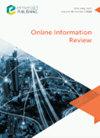There's more to news media skepticism: a path analysis examining news media literacy, news media skepticism and misinformation behaviors
IF 3.1
3区 管理学
Q2 COMPUTER SCIENCE, INFORMATION SYSTEMS
引用次数: 0
Abstract
PurposeWhile much research has examined the effect of media literacy in combatting misinformation, whether and to what extent news media literacy influences misinformation-related behaviors (i.e. misinformation sharing, misinformation correction) and the mediating effect of news media skepticism in the process remain less explored. Moreover, this line of research has extensively focused on a polarized information context (e.g. the USA) with less attention to a context where news information is more regulated and centralized. This paper aims to discuss the aforementioned objective.Design/methodology/approachThe authors conducted a survey study of 720 Chinese adults.FindingsThis study reveals that greater new media literacy predicts higher misinformation correction behaviors, but fails to predict caution in sharing misinformation. Findings further demonstrate a nuanced mediating effect of news media skepticism that challenges previous assertions about its protective role. That is, higher news media literacy is associated with lower news media skepticism; lower skepticism is in turn related to lower misinformation sharing and greater misinformation correction.Originality/valueThe current study integrates news media literacy and news media skepticism in understanding misinformation-related behaviors. Findings generally speak to the tangible benefits of news media literacy in helping motivate corrective actions among the general public. However, this study also strikes a cautious note that future investigations of news media skepticism would benefit from a cultural perspective. Its connections with perceptions and effects on behaviors could vary according to different types of media and political landscapes.Peer reviewThe peer review history for this article is available at: https://publons.com/publon/10.1108/OIR-04-2023-0172对新闻媒体的怀疑还有更多:对新闻媒体素养、新闻媒体怀疑和错误信息行为进行路径分析
目的虽然许多研究都考察了媒体素养在打击错误信息方面的作用,但新闻媒体素养是否以及在多大程度上影响与错误信息相关的行为(即错误信息分享、错误信息纠正)以及新闻媒体怀疑主义在这一过程中的中介作用仍未得到充分探讨。此外,这条研究路线广泛关注两极分化的信息环境(例如美国),而对新闻信息更加规范和集中的环境关注较少。本文旨在探讨上述目标。设计/方法/方法作者对720名中国成年人进行了调查研究。研究发现:高的新媒体素养预示着更高的错误信息更正行为,但不能预测分享错误信息的谨慎性。研究结果进一步证明了新闻媒体怀疑主义的微妙中介作用,挑战了之前关于其保护作用的断言。也就是说,较高的新闻媒体素养与较低的新闻媒体怀疑有关;更低的怀疑反过来又与更低的错误信息分享和更大的错误信息纠正有关。原创性/价值本研究整合新闻媒体素养和新闻媒体怀疑来理解错误信息相关行为。调查结果普遍表明,新闻媒体素养在帮助激励公众采取纠正行动方面有切实的好处。然而,这项研究也谨慎地指出,未来对新闻媒体怀疑主义的调查将从文化角度受益。它与观念的联系和对行为的影响可能因不同类型的媒体和政治环境而异。同行评议本文的同行评议历史可在:https://publons.com/publon/10.1108/OIR-04-2023-0172
本文章由计算机程序翻译,如有差异,请以英文原文为准。
求助全文
约1分钟内获得全文
求助全文
来源期刊

Online Information Review
工程技术-计算机:信息系统
CiteScore
6.90
自引率
16.10%
发文量
67
审稿时长
6 months
期刊介绍:
The journal provides a multi-disciplinary forum for scholars from a range of fields, including information studies/iSchools, data studies, internet studies, media and communication studies and information systems.
Publishes research on the social, political and ethical aspects of emergent digital information practices and platforms, and welcomes submissions that draw upon critical and socio-technical perspectives in order to address these developments.
Welcomes empirical, conceptual and methodological contributions on any topics relevant to the broad field of digital information and communication, however we are particularly interested in receiving submissions that address emerging issues around the below topics.
Coverage includes (but is not limited to):
•Online communities, social networking and social media, including online political communication; crowdsourcing; positive computing and wellbeing.
•The social drivers and implications of emerging data practices, including open data; big data; data journeys and flows; and research data management.
•Digital transformations including organisations’ use of information technologies (e.g. Internet of Things and digitisation of user experience) to improve economic and social welfare, health and wellbeing, and protect the environment.
•Developments in digital scholarship and the production and use of scholarly content.
•Online and digital research methods, including their ethical aspects.
 求助内容:
求助内容: 应助结果提醒方式:
应助结果提醒方式:


